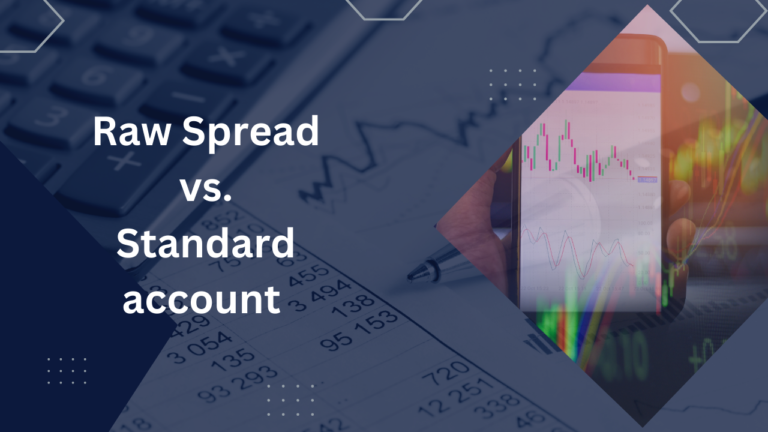Difference between Spread-only account and Raw pricing account
Are you confused about which trading account to open? Learn the difference between a spread-only account and a raw pricing account, and Clear key concepts, explore pros & cons, and find out which is better & select the ideal one.
Table of Contents
Traders have many doubts before starting their journey, such as which instrument to trade and when to trade. With these questions, general questions like what trading accounts are and which account you should comes to traders’ minds.
Traders already have many things to manage, especially at the beginning stage. Being a reputable Beirman Capital, understand the complexity of selecting the ideal account type.
So, in this blog, we will discuss the major account types and the difference between spread-only accounts and raw pricing accounts. It will help you in selecting the ideal one based on your strategy.
Introduction to Trading Account
A trading account functions the same way a bank account does. The only difference is when you deposit money in a bank account, you will get interest. Meanwhile, when you deposit your money in a trading account, you can buy or sell financial assets with the fund. With a trading account, there is no fixed interest here; a trader will either earn a profit or suffer a loss.
In the financial market, there are two major types of accounts: standard (spread-only account) and raw spreads. Thus understanding spread is crucial.
A spread is the difference between the ask (buying) price or bid (selling) price of a financial asset. It is a way for trading brokers make money through price differences. Let us take the example of EUR/USD; the bid price is 1.05299, and the ask price is 1.0531. In this case, the difference of 1.1 is spread and can also be defined as the broker’s earnings per unit.
Before moving to the difference between spread-only accounts and raw pricing accounts. Let us understand their meaning and key features first:
Standard Trading Account or Commission-Free Account
The standard trading account is the most basic type of account for trading in forex, commodities, stock, indices, and other financial instruments. Generally, with standard trading accounts, brokers only earn through the spread and do not charge any commission.
However, it depends from platform to platform. Some brokers may charge little or negligible commission on such accounts. You may have seen brokers’ claims of offering commission-free trading, and traders are generally attracted to such tactics. But in such cases, they are actually offering standard trading accounts and earning money in the form of spreads. Here are the key features of a standard account:
Wide Spreads and Zero Commission:
Generally, brokers charge a specific percentage of commission on every trader. However, traders who don’t want to pay commission can go for standard trading accounts. Brokers depend entirely on currency spreads for earning. Thus, the spreads make a significant amount and are comparatively wider.
Beginner Friendly:
Standard accounts are more suitable for market beginners. As in the beginning, traders generally go for long-term strategies like swing trading or position trading. So the number of trades is comparatively less. In such cases, commission-free accounts are better.
Good Leverage:
Generally, broker platforms offer a decent leverage on standard accounts. So, traders can open large positions relative to their trade capital. At Beirman Capital, we offer a leverage of up to 1:1000 to standard account holders.
Fast and Easy Order Execution:
Standard account, popularly known as a basic account with basic features. So, trade execution with such an account type is quite easy and simple. The trade execution speed is fast, and traders can trade without any delays.
For Traditional and Conservative Trading:
Generally, traders with a traditional trading approach go for standard accounts. These accounts offer decent market liquidity and low volatility, making them suitable for traders with conservative risk models.
Pros of Standard Account
- Simplified features and a trading fee structure make it suitable for beginners.
- Standard account has wider yet stable spreads.
- The accounts are ideal for long-term and passive trading strategies.
Cons of Standard Account
- Does not work well for advanced and high-frequency trading strategies.
- Spreads are based on market conditions, so the trading costs are not transparent.
Raw Spreads Account
Raw Spreads are exactly the opposite of standard accounts. Under this, traders can execute the trade with real market prices set by the interbank without any markup added to spreads. As a result, spreads with standard accounts are zero or negligible. Here are its key features:
Best For Short-term Strategies:
Raw Spreads accounts are suitable for short-term strategies. As such, traders place high-frequency trades on a daily basis, and spreads can make a significant amount. So, Day traders and scalpers generally go for such account types.
Transparent and low-cost trading:
Brokers can generally earn a good amount from hidden spreads. However, with a raw ECN account, the broker does not charge any spreads on trade. Such Brokers only charge a commission, and traders are already aware of the percentage. As a result, the trading cost is low, and they are more transparent.
Zero Spreads:
You may have heard of brokers promoting zero spreads. Well, it is not at all a marketing strategy; they actually do so with a raw spreads account. Raw spreads accounts have negligible spreads, which is why they are popularly known as zero spread accounts. With such accounts, brokers charge in the form of commission rather than currency spreads.
Ultra Fast Execution:
As we have studied, accounts are suitable for short-term traders who place high-frequency traders. And, for such traders, speed matters a lot. Raw pricing accounts offer ultra-fast execution speed, so high-volume traders can place timely trades.

Suitable for Advanced Traders:
Traders with a good knowledge of the market use advanced trading tools and robots for trading. However, not all accounts are suitable for such traders. Raw accounts allow traders to use algorithm-based expert advisor tools and software.
News Trading:
News, big announcements, and economic releases make a sudden change in market conditions. All these lead to wide spreads that ultimately impact traders’ profit. However, with raw accounts, as the spreads are tight, news traders can place trades effectively.
Pros of Raw Spread Account
- Fast order execution makes it suitable for advanced and high-frequency traders.
- Raw account offers more cost transparency as the commission percentage is available on the broker’s sites.
- As compared to standard accounts, raw spreads accounts are low-cost alternatives for advanced traders.
Cons of Raw Spread Account
- Some broker offers low spreads on raw accounts. That means they can still widen during high volatility periods.
- The account structure and features are complex. So, traders with a lack of market knowledge may struggle in trading with such account type.
Difference between Spread-only accounts and Raw-pricing accounts
Basis of Difference | Standard Account | Raw ECN Account |
Trading Fees | Brokers charge trading fees in the form of spreads. The spreads are wider with no commission accounts. | Brokers charge trading fees in the form of commissions. The commission percentage is fees and spreads are negligible. |
Price Manipulations | Brokers add a markup to spreads to earn from the difference. So, there is a chance of price manipulation. | Brokers generally act like middlemen and allow traders to trade at real market prices. So, these accounts offers more transparency. |
Suitability | Standard accounts are suitable for beginner, novice, passive, and long term traders. | Raw Pricing Accounts are more suitable for day traders, scalpers, copy traders and algo traders. |
Volatility | Standard account offers stable market conditions. Traders can observe good liquidity and less volatility. | Traders can observe significant market volatility with raw ECN accounts. |
Transaction Speed | With the standard account, the transaction speed is comparatively slow. | Raw accounts offer ultra-fast transaction speed for executing trades. |
Tool Friendly | Standard accounts are generally for beginners. So they are easy to use. However, it may not be ideal for advanced traders to use advanced tools. | Raw ECN account allows traders to use a range of premium software and tools. |
Factors to Select the Ideal Account Type
Both Raw and Standard account types are good. You can go for any one of them. But checking suitability is a must. Here are the factors you need to check:
Switching Options:
Most reputable brokers offer account switching options. So, in case traders want to switch the account, they can do so efficiently. Go with a broker that offers smooth account switching.
Consider Cost:
Generally, brokers provide trading fees information on their site. Look at the percentage of a commission a broker is charging on raw spreads accounts. Even the spread range is available for diverse currency pairs. These minor details can save you from big trading costs.
Check Hidden Charges:
A broker can charge a trader in different ways. And many of these platforms hide these charges. The hidden charges make a big difference to your trading fees. So, analyze a broker platform carefully to identify any such charges.
Read the Reviews:
A trading platform will tell you limited information. However, for analyzing the account type, you can read the real customer feedback and reviews. This helps you in understanding the key features, pros, and cons of both accounts.
Experience and Strategy:
Your knowledge and how you’re going to execute trades matter when selecting the ideal account type. Thus consider your experience, interest, trading instrument, time frame, trade frequency, risk, and reward expectations when selecting between raw and standard account types.
Conclusion
We have discussed the major account types and the difference between spread-only accounts and raw pricing accounts. If you are also confused between Raw Spread vs Standard account, which to choose, then there is no one answer.
The ideal account type depends on your trading capital, strategies, risk, tools, leverage ratio, and trade duration. Beginner and passive traders can go for standard accounts. Meanwhile, advanced and active traders can go for raw accounts.
Also, traders should understand that the features of standard and raw accounts differ from broker to broker. So, before subscribing to any broker, analyze what the platform is offering. For this purpose, you can open a demo account first and then go for the real one.
At Beirman Capital, we offer both raw and standard accounts for our diverse client base. So you can go for any account type based on your needs and receive 24/7 assistance in case of any issue.
FAQs
What is the standard account?
The standard trading account is the most basic type of account for trading in financial instruments. Generally, with standard trading accounts, brokers do not charge any commission and only earn through the spread.
What is a Raw Spread Account?
Raw Spreads accounts are suitable for short-term strategies. Under this, broker does not charge any spread. Trader can execute the trade with real market prices set by the interbank without any markup added to spreads.
What are the benefits of a raw spread account?
Raw spreads account offers low-cost and transparent trading with ultra-fast trade execution. The account is quite suitable for short-term and high-volume traders.
What is the difference between spread-only accounts and raw pricing accounts?
Spread-only accounts are also known as standard accounts. Under this, brokers charge trading fees in the form of spreads. Meanwhile, in raw spreads, account broker relies on commissions for their earning.
Which account type is suitable for beginners?
A standard account is the most suitable account for beginners and new traders.
Which account type is better for scalping?
A raw spread account is better for scalping. As spreads make a big amount in scalping, and in a raw account, spreads are negligible.
Why does the Raw Spread account have a commission?
In Raw spreads, account spreads are negligible, so the brokers charge traders in the form of commission.
Are there any hidden fees in a Raw Spread account?
No, traders need to pay a commission in a raw spread account. However, hidden charges also depend on the broker.
Get Complete Forex Trading Assistance



